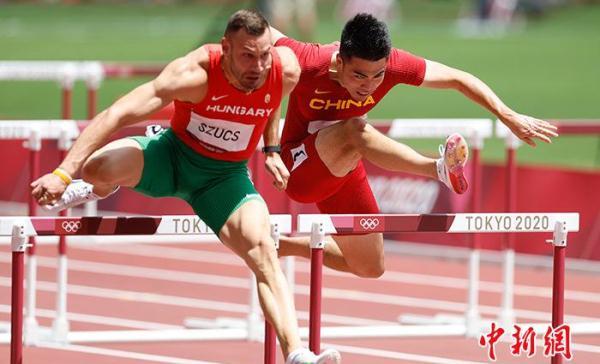China News Service Tokyo, August 4 Title: Xie Wenjun 110 meters hurdles did not qualify for the final: I still have dreams
China News Service reporter Xing Chong
In 13.58 seconds, Xie Wenjun, a Chinese short-spanner who participated in the Olympic Games for the third time, still failed to go any further. His dream has always been to reach the olympic men's 110m hurdles final, but on the 4th in Tokyo, this dream still failed to come true.
In fact, he has the full strength to even hit the medals. At the 2019 World Championships in Doha, Xie Wenjun broke through the "Group of Death" in the semi-finals and reached the final with 13.22 seconds, and only 3 hours later he ran 13.29 seconds in the final to finish fourth, which was the best time for a Chinese player in the men's 110m hurdles after Liu Xiang.

On August 4, local time, China's Xie Wenjun (right) in the semifinals of the men's 110m hurdles in athletics. On the same day, the semi-finals of the men's 110m hurdles at the Tokyo Olympic Games were held at the Tokyo New National Stadium, and China's Xie Wenjun missed the final with a time of 13.58 seconds. Photo by China News Service reporter Tomita
Because of Liu Xiang, the men's 110-meter hurdles have become a track and field project that the Chinese people are quite concerned about. At the 2004 Athens Olympic Games, Liu Xiang successfully reached the top and became the first male Olympic champion in China's athletics project, and the Olympic record he set has remained to this day.
After Liu Xiang retired, Xie Wenjun, who was in the same door, was always known as "Liu Xiang's successor", and he also proved the strength of the new generation of "Asian Lan King" with the results of the National Games Champion, the Asian Games Champion, and the Fourth World Championship. However, in the Olympic arena, Xie Wenjun, who "gambled everything", still failed to realize the "dream in his heart".
At the 2012 London Olympics, 22-year-old Xie Wenjun ran a new personal best in the semi-final of 13.34 seconds, but finally ranked 9th without reaching the final; four years later, in Rio, the preliminary day of the sudden heavy rain, Xie Wenjun only ran 13.69 seconds and ranked 25th, after missing the semifinals, his face was full of disappointment, bluntly saying "can't think".
This time, it was because of injuries that blocked him from the final.
The sudden outbreak of new crown pneumonia disrupted Xie Wenjun's training rhythm. After returning to China last year, Xie Wenjun wanted to improve the weak links in the starting technology, and followed Randy, a foreign teacher who guided Su Bingtian, to make technical adjustments, which had already made obvious gains, but the injury appeared so "out of time".
It turned out that Xie Wenjun had a serious strain on his left leg, and the improvement of starting technology made the load on the tendon of his left leg larger, which eventually led to tendon inflammation. To be on the safe side, he had to change back to the less risky "eight-step hurdles" and subsequently missed many races, and his best time of the season before the Olympics was only 13.49 seconds.
Xie Wenjun said that in more than ten years of short-span career, he has been chasing the light of his brother Liu Xiang. "In Tokyo, it may be the last and best chance to pay tribute to the master and brother." In order to improve by 0.1 seconds, Xie Wenjun gambled on everything - whether it was "eight to seven" in the upper hurdles, optimizing the hurdles movements, or following Randy to improve the starting technique, and then changing back to eight steps after injury, it was a "gamble" again and again.
"I don't regret it, but if I don't give it a fight, I will regret it!" After missing the final, Xie Wenjun said.
Xie Wenjun is 31 years old this year, will he continue until the Paris Olympics three years later? "The impact of injuries is too great, I still have dreams." He replied.
However, for the Chinese men's short span project, the more serious question is, after Xie Wenjun, who can carry the banner and become the next successor?
At present, the only one who can run in 13.50 seconds in China is Zeng Jianhang, who has trained with Liu Xiang and Xie Wenjun's mentor Sun Haiping, but the results have been up and down. Although the 22-year-old also reached the Tokyo Olympics, he was unable to make the trip due to an accidental fracture during the first half of the competition.
In contrast, Japan, with the help of the Olympic Games, Japan has made significant progress in the men's short span event. The 25-year-old Daiwang Kanai ran 13.16 seconds this year, and the newcomer Junsuke Izumitani, born in 2000, won the domestic selection in 13.06 seconds. The two also reached the semi-finals of the Olympic Games, with Junsuke Izumiya and Xie Wenjun running 13.35 seconds in the same group and failing to qualify by one place; Andai Daiwang Unexpectedly fell and failed to reach the final.
Chinese athletes have already achieved nine consecutive championships in the men's 110m hurdles at the Asian Games, and the most realistic question at the moment is whether the Chinese team can continue to be brilliant at the Asian Games held in Hangzhou next year. Who can realize Xie Wenjun's unfinished dreams? (End)
Source: China News Network